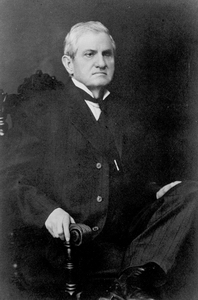Ben Tillman: Difference between revisions
imported>Petréa Mitchell m (→External Links: Alphabetization) |
imported>Subpagination Bot m (Add {{subpages}} and remove any categories (details)) |
||
| Line 1: | Line 1: | ||
{{subpages}} | |||
[[Image:BenTillman.jpg|thumb|right|Benjamin Tillman]] | [[Image:BenTillman.jpg|thumb|right|Benjamin Tillman]] | ||
| Line 38: | Line 40: | ||
<references/> | <references/> | ||
---------- | ---------- | ||
Revision as of 05:10, 25 September 2007
Benjamin Ryan Tillman (August 11, 1847 - July 3, 1918) was an American politician of German descent who served as governor of South Carolina, from 1890 to 1894, and as a United States Senator, from 1895 until his death. He was known as the foremost spokesman for white supremacy, and as the champion of white farmers and millhands, and the enemy of blacks and the upper class.
Early Career
Tillman was born near Trenton, South Carolina. He left school, in 1864 when he was disabled by an illness, which resulted in the removal of his left eye; he never served in the Confederate Army. During Reconstruction, he became a paramilitary fighter in the struggle to overthrow the interracial Republican coalition in the state and disempower the black majority; he was present at the Hamburg Massacre, in July 1876, during which black Republican activists were murdered by Tillman's fellow "Red-shirts."
Governor
Posing as the friend of ordinary white farmers, Tillman took over the South Carolina Farmers Alliance, and used the organization as a platform for his political ambitions. He was elected Governor of South Carolina, in 1890, and served from December 1890 to December 1894. He helped establish Clemson College and Winthrop College while in office. When the Alliance founded the Populist Party on the Ocala Demands, Tillman arranged for the South Carolina Democratic Party to adopt the platform, wholesale. The strategy prevented the development of an independent Populist Party and the biracial politics of North Carolina--thus assuring white control through the dominant, white Democratic Party.
He was largely responsible for calling the State constitutional convention, in 1895, that disfranchised most of South Carolina's black men and required Jim Crow laws. As Tillman proudly proclaimed in 1900, "We have done our level best [to prevent blacks from voting]...we have scratched our heads to find out how we could eliminate the last one of them. We stuffed ballot boxes. We shot them. We are not ashamed of it." (Logan, p. 91)
Senator
He was elected as a Democratic member to the United States Senate in 1894, and was reelected in 1901, 1907, and 1913, serving until his death. A hotheaded and intemperate debater, Tillman became known as "Pitchfork Ben" after a speech he made on the Senate floor in 1896. In this speech, Tillman made several references to pitchforks and threatened to go to the White House and "poke old Grover [Cleveland] with a pitchfork" to prod him into action.
During his Senate career, he was censured by the Senate, in 1902, after assaulting another Senator; became the chairman of the Committee on Revolutionary Claims (57th through 59th Congresses); served on the Committee on Five Civilized Tribes of Indians (61st and 62nd Congresses); and the Committee on Naval Affairs (63rd through 65th Congresses). During World War I, impatient with the Navy's requests for larger battleships every year, he ordered the United States Navy to design "maximum battleships," the largest battleships that they could use.
Tillman took the lead in railroad regulation, though his foe Republican President Theodore Roosevelt out-maneuvered him in passage of the Hepburn Act of 1906. Tillman was the primary sponsor of the "Tillman Act," the first federal campaign finance reform law, which was passed in 1907 and banned corporate contributions in federal political campaigns.
Tillman opposed American annexation of the Philippines because he feared an influx of non-white immigrants would result, undermining white racial purity. He was one of the most outspoken and unapologetic advocates of white supremacy ever to serve in Congress.
Tillman died in Washington, DC and is buried in Ebenezer Cemetery, Trenton, South Carolina.
Bibliography
- Burton, Orville Vernon. In My Father's House Are Many Mansions: Family and Community in Edgefield, South Carolina (1985) online edition
- Kantrowitz, Stephen. Ben Tillman and the Reconstruction of White Supremacy, (2000) University of North Carolina Press
- Clark, Kathleen. "Who Made Jim Crow?" Reviews in American History 2001 29(2): 238-246. Issn: 0048-7511 Fulltext: in Project Muse; reviews Kantrowitz book
- / online review by Bruce Palmer
- Kantrowitz, Stephen. "Ben Tillman and Hendrix McLane, Agrarian Rebels: White Manhood, 'The Farmers,' and the Limits of Southern Populism." Journal of Southern History. 66#3 (2000) pp 497+. in JSTOR; online edition
- Simkins, Francis Butler. The Tillman Movement in South Carolina (1926) online edition
- Simkins, Francis Butler. Pitchfork Ben Tillman, South Carolinian (1944)
- Simon, Bryant. A Fabric of Defeat: The Politics of South Carolina Millhands, 1910-1948, 1998 online edition
External links
- "Their own Hotheadedness": Tillman speech in Senate advocating disenfranchisement of blacks and lynching of those who protested
- "The White Man's Burden" as Prophecy. Tillman speech in Senate denouncing U.S. imperialism in the Philippines on humanitarian and patriotic grounds
